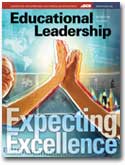For two weeks in August, I was an Olympics junkie—watching TV every night and reading the newspaper reports in the morning. I have to admit that each day I checked where the United States was in relation to China, Russia, and Great Britain. Was the United States going to be overtaken in terms of most medals won? Which was most prestigious—the number of gold medals or the overall number of medals won?
And who was the best athlete overall? The decathlon winner who excelled at many sports? Or Michael Phelps, swimming his way to eight gold medals? There were the athletes who broke world records, and there were those who overcame enormous obstacles—from age to injury to quirks of chance—to earn recognition—or not. And there was the story of Iceland, whose handball team won a lone silver medal, prompting a national celebration. Win or lose, watching the pursuit of excellence in sports was an excellent pastime.
Many of the questions about the Olympics connect to the theme of realizing excellence in our schools, although the stakes are even higher and issues more complex in schools than in the sports arena.
First, there is the question of what excellence entails. In education as in sports, we know that excellence is more than speed and a mastery of basic skills, although those measures count. Questions arise: Is excellence the best PISA scores, or is it proficiency for all by 2014, or is it something else entirely? In education, unlike in the Olympics, our students are preparing for life, not one big test. Considering the needs of the changing world, does excellence in math and science count more than excellence in the arts, communications, or problem solving—or is it the other way around? Does excellence always equal As? Or does excellence mean we must prepare emotionally healthy, challenged students—the whole child—to tackle the real world?
Just as athletes each year outperform previous champions, it is obvious that the educational excellence of the future will not exactly mirror the excellence of the past. In this issue, several of our authors discuss international realities (pp. 26 and 44). Nations that just a few years ago had low high school graduation rates have boosted those rates. Many that have used traditional instructional methods for years have recently found more creative ways to unleash potential. Quite a few world-class school systems are putting resources into the preparation and professional development of teachers, expecting excellence of them and of their students. But at the same time, some developing nations still do not educate the majority of their children.
The interest in international competition often overshadows all that we can learn from one another. After all, if other countries prepare students to contribute more to future human achievement in science, business, the arts, and, yes, sports, don't we all benefit?
In his article, “Excellence for All,” Robert Sternberg (p. 14) presents some scenarios often seen in schools today. Some schools give all their energy to boosting the performance of their lowest achievers. Others aim to challenge only the students with the highest potential. Still others are intent on increasing their statistical averages on the tests they give students. Sternberg asks a series of questions: Do we really want our schools to resemble test-preparation cram courses? Are we really encouraging excellence if we minimize programs that are essential to an excellent education—such as music, art, and physical education? And, finally, Can we really consider a school excellent if it settles for mediocrity for a large portion of its students?
A final connection between excellence at the Olympics and excellence in schools comes down to a matter of motivation. Whether the coaches exerted powerful control or were true “guides on the side,” it is obvious that they had much to do with helping the athletes aspire to and achieve excellence. The best international school systems also both challenge and support their students. What drives an individual person to seek excellence in sports might be recognition and rewards, the competition against all comers, or even doing one's personal best. In schools, too, those things motivate, but the purpose, as William Damon (p. 8) tells us, is larger. “Only when students discover personal meaning in their work do they apply their efforts with focus and imagination,” he writes.Purpose acts as the moral north star on the route to excellence. It offers a steady beacon for inspiring and directing students' best efforts over the long haul, within the classroom and beyond.
When you have a purpose, you know that everything you do counts, even if you don't win a medal.

